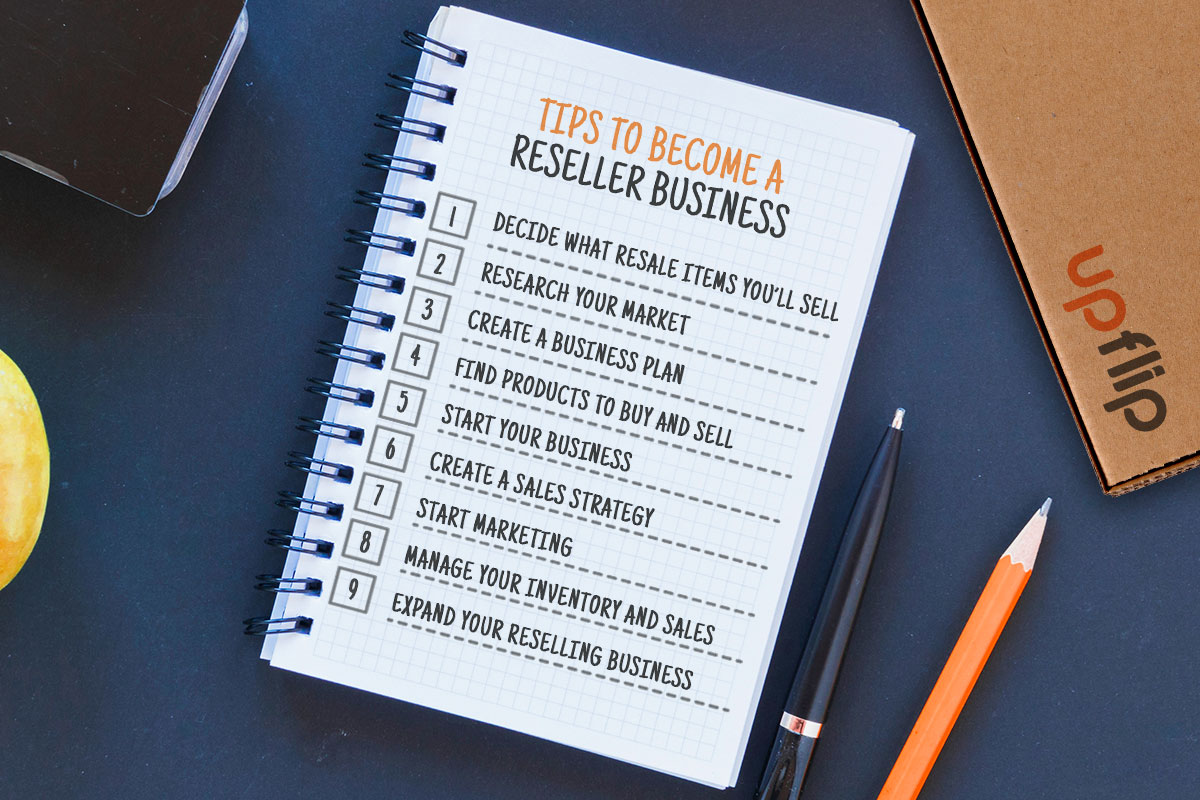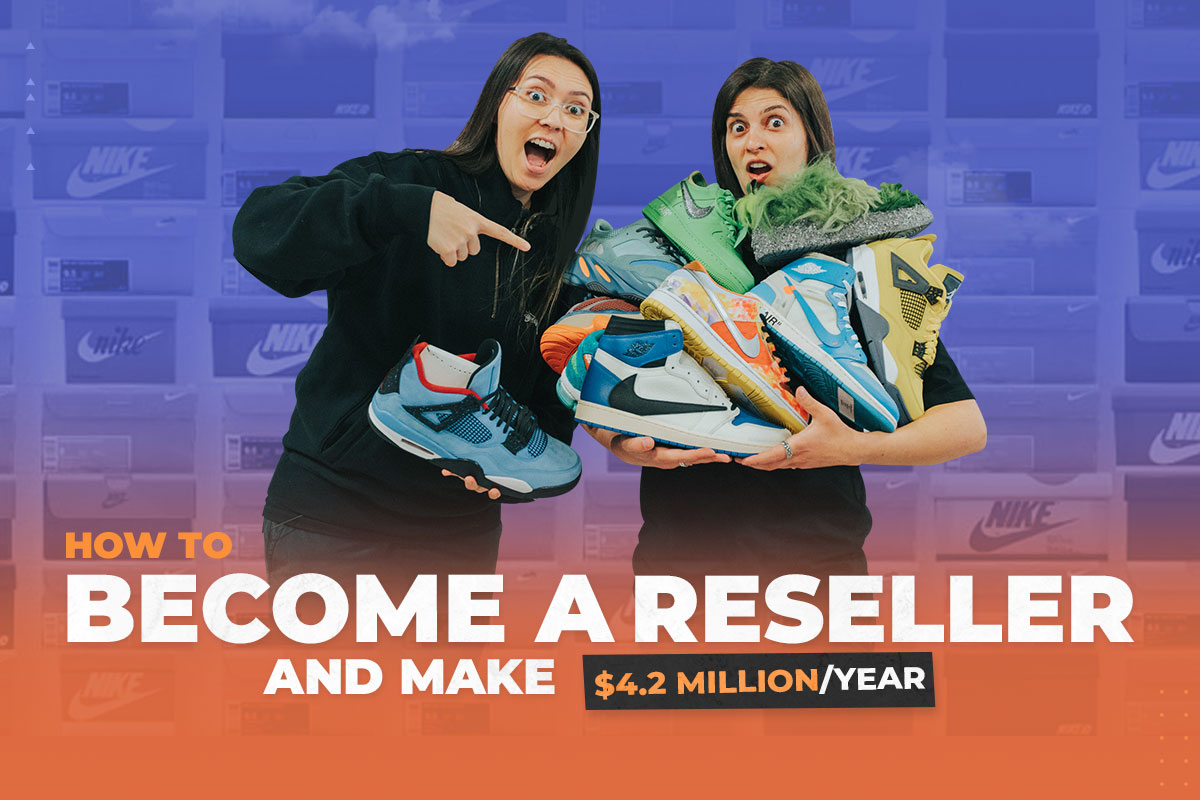Have you ever wondered how to become a reseller? Becoming a reseller with an online store can be a great way to start your own business or add another revenue stream to your existing business.
Tia Hall started Sneak City in her parents’ garage in 2018 and has since opened two retail locations. Today, she and her business partner Anastasia Lemley make $4.2 million annually.
They started reselling shoes they found at thrift stores for just $50. Now their business is one of the best shoe resellers worldwide.
Want to learn from Tia’s success? We have all the info you need:
- What is a Reseller Business?
- How to Make Money Reselling
- Is a Reseller a Home-Based Business?
- How Much Do Resellers Make?
- How to Become a Reseller Business
- Step 1. What Can I Resell To Make Money?
- Step 2. Research Your Niche Market
- Step 3. Create a Reseller Business Plan
- Step 4. Find Resale Products
- Step 5. Create Your Resale Business Model
- Step 6. Implement Your Sales Strategy
- Step 7. Start Marketing Your Reselling Business
- Step 8. Manage Your Inventory and Sales
- Step 9. Expand Your Reselling Business
- Step 1. What Can I Resell To Make Money?
- Go Resell With Your Own eCommerce Business
Keep reading to learn how to become a reseller business, or click any of the links above to jump to the section you need.
What is a Reseller Business?
A reseller purchases products from a manufacturer or distributor and then sells them to customers for a profit through an online store or retail location. Tia explained how to begin a reseller business:
Check out our interview with Tia below.
How to Make Money Reselling
You have to spend money to make more money. The trick is to find products that people are selling that you can buy and sell for more than your costs as the seller, which include the following tasks:
For most industries, you’ll want to pay somewhere between 30-70% of what you can sell directly to your own customers. That’s what makes a reseller profitable.
Is a Reseller a Home-Based Business?

Yes. Resellers can be home-based businesses, but it really depends on your living situation. Each local jurisdiction and homeowners association may have policies about whether you can start a business from home. Tia told us:
You might also want a shop if you have a large local customer base. Letting them pick up locally can improve the customer experience and reduce your business costs like gas and shipping.
How Much Do Resellers Make?
Typical profit margins for reselling products or services vary widely depending on the industry and the products or services sold.
In general, resellers can expect to make anywhere from 10% to 50% profit margins on their sales. However, some industries may have higher profit margins, such as luxury goods or high-end technology products. Others have lower profit margins, such as basic household items or low-cost services.
Tia explained how much she makes to resell shoes:
That gives her a 30% gross profit margin in her reseller business. Keep reading to learn more about how to become a reseller business.
How to Become a Reseller Business

To become a reseller, you’ll need to:
- Decide what resale items you’ll sell
- Research your market
- Create a business plan
- Find products to buy and sell
- Start your business
- Create a sales strategy
- Start marketing
- Manage your inventory and sales
- Expand your reselling business
Keep reading to learn the straightforward steps you’ll take to become a reseller.
Step 1. What Can I Resell To Make Money?
The products and services you can resell are virtually endless. The key is finding and selling items or services with high demand and a good profit margin. With the right strategy and execution, anyone can become a successful reseller.
Here are some possible business ideas as a reseller:
- Consumer Electronics
- Resell Clothes and Accessories
- Software and Digital Product Reselling
- Services
- Car Accessories
- Antique Furniture
- Collectibles
Find out more about each product category and why a small business might want to resell items.
Electronics
One of the most common products that resellers sell is consumer electronics. This includes items like smartphones, laptops, tablets, and gaming consoles. These products are always in demand and have high profit margins, which makes them an attractive option for resellers.
Mike Wilson is an eBay seller who started a reseller business to fill his time in retirement. He told us:
Check out our interview with him below.
Clothing and Accessories

Another popular product category for resellers is clothing and accessories. This includes items like shoes, handbags, jewelry, and clothing. Resellers can purchase these items in bulk from manufacturers or wholesalers and sell them at a markup to customers.
Ryan Hogue resells clothes on his ecommerce store using print-on-demand. Check out our interview with him below.
Software and Digital Products
Software and digital products are also popular among e-commerce store resellers. This includes items like software licenses, e-books, and online courses. These products are excellent for resellers who want to start a reselling business with low startup costs.
You can either use affiliate programs, open source software, or whitelabel digital products to resell software. Check out our interview with Mat Diggity to learn his approaches.
Not into selling physical goods? Let’s have a look at some services you can resell.
Services

Finally, services can also be resold. This includes things like web design, marketing, and consulting services. Resellers can partner with service providers and sell their services to customers at a markup. This can be a lucrative and profitable business model for those with expertise in a particular area.
The products and services that can be resold are virtually endless. The key is finding a product or service with high demand and a good profit margin. By building the right relationships with suppliers, you’ll be on your way to becoming a successful online reseller yourself.
Now that you have an idea of how to find suppliers, let’s look at getting customers.
Step 2. Research Your Niche Market
Before diving into the world of reselling, it’s crucial to understand your target market. Researching your target market will help you:
- Identify potential customers
- Create a buyer persona
- Analyze your competition
This knowledge will guide you in selecting the right products to offer and crafting an effective marketing strategy.
Identify Potential Customers

You can begin by identifying your niche. This involves determining the specific product categories or industries you want to focus on. By specializing in a particular niche, you’ll better understand your target customers and the products they’re searching for, making it easier to cater to their needs.
Create A Buyer Persona
Creating buyer personas to represent your ideal customers is a smart way to keep your focus on your target audience. These personas should include demographics, interests, and buying habits. This information will help you tailor your marketing efforts and product selection to appeal to your ideal customer base.
One of the aspects of the persona you really want to understand is what your customers can afford. Jim Sears makes $62K per month because he recognized that selling packs of sports cards in addition to individual and boxes of cards can be highly profitable as a reseller. He told us:
Hear more from Jim in the video below.
Research Your Competition
Finally, analyze your competition. You can research other resellers in your niche to understand their strengths and weaknesses. This will enable you to differentiate your offerings and identify growth opportunities to position yourself as a go-to source for your target market.
Make sure to document everything you learn and share it with others to develop your niche expertise.
Step 3. Create a Reseller Business Plan

A reseller business plan should:
Check out our blog about writing a business plan to learn more about these aspects.
Step 4. Find Resale Products
To resell products you’ll have to find the product offerings at reasonable price points. Try these tips to get started:
- Search for directories of suppliers online
- Go to places you can purchase products
- Vet suppliers
- Get samples
- Negotiate the terms of the agreement
Search for Supplier Directories Online

For those of you who want to sell your own products or other companies new products, you’ll want to research reliable wholesale suppliers or manufacturers to source products. Look for industry-specific directories or databases that list suppliers and manufacturers in your niche. You can also use search engines to find potential suppliers and manufacturers.
Some of the popular ones are:
- Reference USA: The website claims to have over 400 data points on the majority of businesses in the U.S including which wholesale supplier provides each of their products and when the last shipment was.
- ThomasNet: Search a wholesale database by size of company, compliance standard, types of products, and annual sales.
- Wholesale Central: Search their database or check out one of their tradeshows.
- Worldwide Brands: This wholesale supplier directory only lists the highest level of wholesalers and dropshippers. Cut out middle men and get the lowest prices possible.
Go To Places That Sell Items
Another way to find resale items is to go to places where people sell products. Many resellers will go to places like:
- Online Marketplaces
- Trade Shows
- Industry Events
- Yard Sales
- Used Clothing Store
- Social Media Sites
- Other Retailers
- Estate Sales
Tia told us:
If you’re buying from another business, you’ll need a resale license if you don’t want to pay sales tax.
Vet Potential Suppliers

Once you have a list of potential suppliers or manufacturers, it’s important to vet them thoroughly.
Be sure to read reviews and check their ratings on platforms like Google, Yelp, or the Better Business Bureau to ensure they have a good reputation. Then, check their credentials, such as licenses, certifications, and insurance. Ask for references and contact them to learn about their experiences working with the supplier or manufacturer. Check out this article on vetting suppliers.
Request Samples
Next, request samples of products to test their quality and ensure they meet your standards. If they don’t, keep looking. Get ready to negotiate if the manufacturer provides a good quality product. Learn more about ordering samples.
Negotiate with Suppliers

Finally, feel free to negotiate with your suppliers or manufacturers. Ask about their pricing, minimum order quantities, and shipping options. Define your expectations and requirements, then make sure you have a written agreement before purchasing products. Rocket Lawyers has free manufacturing contract templates.
With these tips, you can find reliable suppliers or manufacturers to help you become a successful reseller.
Step 5. Create Your Resale Business Model
Before becoming a reseller, it’s important to understand the legal implications of this business model. You’ll need the following components in place:
- Business Structure: LLCs and corporations are popular types of businesses for resellers.
- Resale Permit: Most states have a resale permit (sometimes called a resale certificate). These allow you to buy products without paying tax. Learn more about each state’s resale permits.
- Business License: May be required by state or local governments to operate legally. This permit business license allows you to purchase goods from wholesalers without paying sales tax, as you will collect it from your customers when you resell the products.
- Business Account From Bank: Make sure to get a business bank account to keep your business finances separate.
We’re going to talk about sales taxes separately.
Sales Tax
You’ll need to keep accurate records of your sales and purchases for tax purposes. As a reseller, you will collect sales tax and remit sales tax to the appropriate government agency.
It’s important to familiarize yourself with your state and country’s tax laws to ensure you comply. If you reach the point that you have a national presence as an online business, you’ll have to comply with thousands of different tax requirements. Avalara is useful for sales taxes if your website doesn’t have tax handling options.
Step 6. Implement Your Sales Strategy

With the right strategy and execution, anyone can become a successful reseller.
You’ll want to consider multiple ways of selling your resale products when you start a reselling business. Some of the most common ways of selling include:
- Listing on Amazon: Find out how to sell products on the world’s largest online marketplace by dropshipping products.
- Niche Marketplaces: Selling on specialty platforms can be a great way to sell products fast. With StockX you can resell the product immediately if there is a bid you are willing to accept on the type of product you are selling.
- Your Website: If you don’t get sales through a website, you’re leaving a lot of money on the table because a business grows by collecting data and increasing lifetime customer value. Learn how to create a website.
- Social Media: You can develop a following and sell on social media. Learn to earn on TikTok.
- Retail Store: Sell in your own retail store or provide wholesale orders to other retailers.
Step 7. Start Marketing Your Reselling Business

Marketing your reseller business involves:
- Setting Prices
- Creating a Brand
- Networking
- Providing Great Customer Service
Get ready to learn how to market a reselling business.
Setting Prices
Competitive pricing is one of the best marketing strategies for resellers to attract customers. Customers are always looking for the best deals, so make sure your prices are the same as your competitors. You can also offer discounts or promotions to entice customers to choose your products over others.
Our dropshipping blog has an example of how pricing works.
Creating a Brand
Another effective strategy is to focus on building a strong brand image. This means creating a unique and memorable brand identity that resonates with your target audience.
Use social media platforms to showcase your brand and engage with customers. You can also invest in professional branding services to help you create a cohesive and effective brand image.
Mike Andes told us:
Learn more about branding.
Networking
Networking is crucial for resellers. Attend industry events, trade shows, and conferences to connect with potential customers and other professionals in your field. This will help you build relationships and establish yourself as a trusted and knowledgeable reseller in your industry. Check out some networking groups for businesses.
Providing Great Customer Service
Finally, customer service is key to attracting and retaining customers. Focus on providing outstanding customer service by responding quickly to inquiries and resolving issues promptly and efficiently. Positive reviews and word-of-mouth recommendations from satisfied customers can go a long way in attracting new customers to your small business.
Get some great customer service tips.
Step 8. Manage Your Inventory and Sales

Choosing the best inventory management and sales software for resellers depends on various factors such as budget, business size, and specific features needed. Here are some top options:
Each of these services offers a range of features, such as inventory tracking, order management, and shipping management. These tools will help you provide all the necessary documentation to file your taxes. Resellers should evaluate each service based on their specific needs and budget before choosing the right one for their business.
Step 9. Expand Your Reselling Business

To expand your online resale business, consider some of these options.
- Upsell customers. A reselling business can do this both in person and in your own ecommerce store.
- Increase your marketing spending.
- Start reselling additional products.
- Create a customer loyalty program.
- Partner with or buy other businesses.
- Add a retail store.
- Expand to other regions.
- Open a reselling business e-commerce store if you don’t already have one.
Go Resell With Your Own eCommerce Business
Now to know how to become a reseller.
You are sure to find plenty of amazing used products to resell at garage sales and the variety of other places we’ve named above. Never forget one person’s trash is another person’s treasure.
What kind of items would you like to resell?




